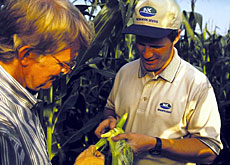
Experts say GM crops alone will not end hunger

Swiss experts have warned that genetically modified (GM) crops are not the only way to combat global hunger.
A government advisory body said on Thursday that not enough research had been carried out into the impact of gene technology.
The Ethics Committee on Non-Human Gene Technology called for closer coordination of state-funded research programmes in an effort to help improve the provision of food in the developing world.
The committee’s report comes less than four months after the United Nations Food and Agriculture Organization (FAO) published a study into the environmental effects of GM crops.
The FAO found that biotechnology could help farmers in the developing world by increasing both the amount and quality of crops grown. The report added that genetic modification could even create crops that target the specific problems and needs of developing countries.
The United States has said in the past that GM crops could help to address the needs of “hundreds of millions” of people who do not have enough food.
But critics argue that proposals to sell such crops to the developing world fail to address the complex issue of how to deal with hunger and malnutrition.
“Simplification”
“It is a simplification to assume that the food situation will fundamentally improve by relying on gene technology,” said the ethics committee’s report.
The authors argue that state-funded research projects should not focus exclusively on such technology.
The committee called on the scientific community to consider other options, adding that alternative methods were often more promising and produced better results.
Florianne Koechlin, a renowned biologist and critic of gene technology, said the majority of committee members shared the concern that the promotion of GM crops could lead to the extinction of certain plants and species.
Christoph Stückelberger of the Swiss charity, Bread for All, said there was also a risk that modern technology could ignore the religious and social aspects of agricultural life in the developing world.
Equal right
The committee concluded that citizens in both the developed and developing world had the same right to a sufficient and healthy diet and that they were entitled to decide for themselves how the food they eat should be produced.
The experts added that it was vital to ensure that the use of gene technology in developing countries did not lead to tensions within a society or between states.
They also called for increased efforts on the part of the industrialised world to provide the know-how for other countries to take informed decisions on such technology.
The committee said the purpose of its report was to contribute to the debate about genetic modification and to advise Swiss politicians and the government’s development agency on the issue.
swissinfo with agencies
The Ethics Committee on Non-Human Gene Technology has warned against focusing research exclusively on gene technology to combat global hunger.
The government advisory body called for increased efforts to boost other aspects of research.
The committee, which was established in 1998, is made up of 12 experts from a variety of sectors, including medicine, biology and philosophy.
In 2003, GM plants were grown on more than 65 million hectares of land in 18 countries.
Nearly seven million farmers, a third of whom live in developing countries, produce GM food.
Gene technology is most often used to produce soy, maize, cotton and rapeseed oil.

In compliance with the JTI standards
More: SWI swissinfo.ch certified by the Journalism Trust Initiative






































You can find an overview of ongoing debates with our journalists here . Please join us!
If you want to start a conversation about a topic raised in this article or want to report factual errors, email us at english@swissinfo.ch.